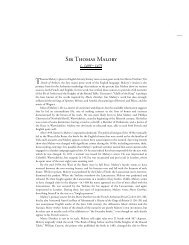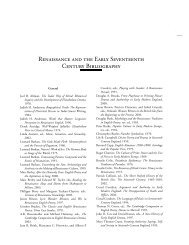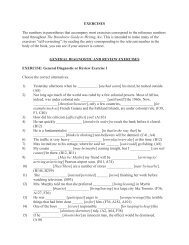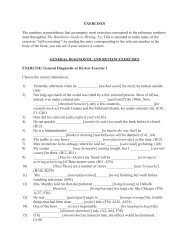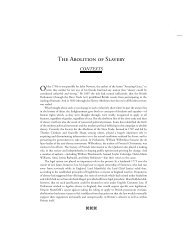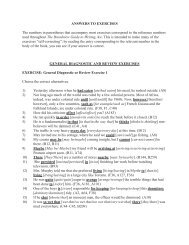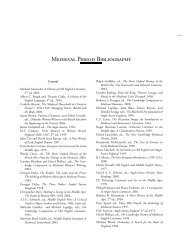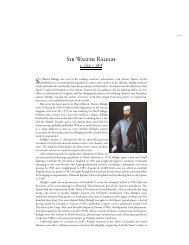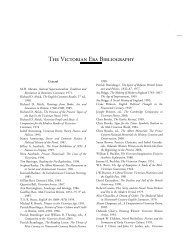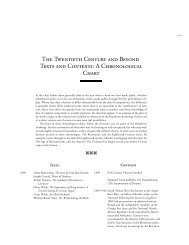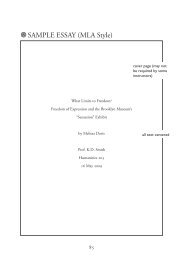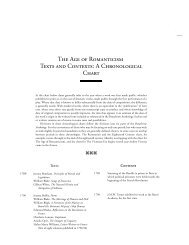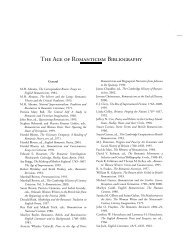Thomas Lodge - Broadview Press Publisher's Blog
Thomas Lodge - Broadview Press Publisher's Blog
Thomas Lodge - Broadview Press Publisher's Blog
Create successful ePaper yourself
Turn your PDF publications into a flip-book with our unique Google optimized e-Paper software.
200<br />
205<br />
210<br />
215<br />
220<br />
225<br />
230<br />
favourable to me as to the lioness in bequeathing<br />
me one princely son, I might then have exclaimed<br />
on destiny if I had lost him, and not have disclaimed<br />
delight in that I ever lack him. But thou<br />
art like the veruen, 1 Nature: poison one ways, and<br />
pleasure another, feeding me with grapes in show<br />
like to Darius’s vine, 2 but not in substance like<br />
those of Vermandois. 3 Thou art a partial 4 mistress,<br />
pleased in thy secrecy, peremptory in thy<br />
severity. But why blame I Nature and accuse not<br />
Fortune? She is the mistress of time and the minister<br />
of tyranny, supplanting Nature in some<br />
things and desert in all things. But why blame I<br />
Fortune, who is only active in mutabilities of<br />
estate not in hidden causes of Nature? You are<br />
they, O Destinies, whom neither tears may attaint,<br />
prayers persuade, vows prevent, or sighs provoke!<br />
You have made Nature a stepdame, ordained<br />
Fortune my foe, and by your secret influence have<br />
prevented my desired favours! Alas, poor unhappy<br />
lady, born to neglect, bewitched with necessities!<br />
Why live I to be a byword 5 of the world for my<br />
barrenness? O my soul, were death as partial as<br />
thou impatient, he could not be so forward to<br />
destroy as thou to die.”<br />
In this sort with many bitter sighs, she abruptly<br />
finished, washing her lovely visage with lukewarm<br />
tears, beating her amiable breasts with bitter<br />
strokes, till finally she burst out into this final<br />
outrage: “Well, you heavens, since you neglect me,<br />
I respect you not. If God vouchsafe me no son,<br />
the Devil send me one, so, though my womb be<br />
wretched in bearing, yet haply 6 I shall escape the<br />
scandal of unfruitfulness.”<br />
1 veruen perhaps “verven” = “vervain,” which is a medicinal plant.<br />
Culpeper notes its usefulness to treat disorders of the womb, jaundice,<br />
snake bites, and a variety of other problems. He does not<br />
mention that it is also a poisonous plant (Culpeper’s Complete Herbal and<br />
English Physician [London, 1814], p. 187).<br />
2 Darius’s vine Darius I (d. 486 BCE), king of Persia. His vine was<br />
made of gold, with leaves of emeralds, and grapes of carbuncles<br />
(precious red stones). See Herodotus, Histories, trans. R. Waterfield<br />
(Oxford, 1998), 7.27-29; Xenophon, Hellenica, 7.1.38.<br />
3 Vermandois a region in northern France.<br />
4 partial biased, unfair.<br />
5 byword an object of scorn or contempt.<br />
6 haply by chance; perhaps, maybe.<br />
T HOMAS L ODGE<br />
235<br />
240<br />
245<br />
250<br />
255<br />
260<br />
265<br />
270<br />
10<br />
Aubert, not able to endure any longer to hear<br />
her lament, broke off her impious discourse by his<br />
unexpected presence, where beholding his<br />
beloved Editha bathed in tears, subdued with<br />
sighs, and blushing for that she was bewrayed 7 he<br />
thus began to comfort her:<br />
“Ah, my Editha, the creature must not war with<br />
the creator, nor expostulate unkindness with God,<br />
who bestoweth mercies for good deserts and miseries<br />
for neglect of duty. He is not tied to our will,<br />
but we ordered by his power, sooner favouring<br />
those by whom he is feared than such who would<br />
force destiny, which will not be defrauded. What,<br />
though, my princess, thou art childless, yet art<br />
thou not comfortless. What, though as yet dispossessed<br />
of a son, yet not disappointed of thy hope.<br />
The trees that are longest in growth are fastest 8 in<br />
root, whereas flowers have but their morning’s<br />
flourish and their evening’s funeral. Thou art yet<br />
young and meet for increase, 9 fair and fit for<br />
fancy, 10 ordained before thou be a matron to<br />
become a mother. Frolic, Editha! Methinks I see a<br />
babe sucking at these breasts, an infant dallying in<br />
this bosom, and a son who shall pay thee with as<br />
many smiles as thou hast been pained with millions<br />
of sighs.”<br />
So saying, he sweetly embraced her, and,<br />
finding a fit opportunity wherein both he and she<br />
might communicate their fancies, he dried up the<br />
tears from her eyes with his kisses, and, folding his<br />
arms about her neck, left such a pledge with her of<br />
her most desired pleasure that, as the most historiographers<br />
aver, he in that place begot her with<br />
child. After many their delicious encounteries 11<br />
and interchange of affections, they both of them<br />
arose and went to horse, and were no sooner<br />
issued from the thicket but they met with their<br />
whole train, who presented the Duke and Duchess<br />
with the prey they had taken, which kind couple in<br />
returning homewards with privy smiles discovered<br />
7 bewrayed discovered, exposed.<br />
8 fastest most firmly fixed in place.<br />
9 meet for increase fit for reproduction.<br />
10 fancy love.<br />
11 encounteries encounters (a rare usage according to OED).



